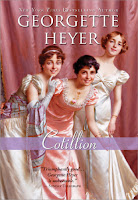 |
| Click to view on Goodreads |
Such was the whimsical, some would say outrageous, statement of the ageing Mr Penicuik, to the three of his great-nephews gathered around him.
The future of his vivacious step-daughter, Miss Kitty Charing, was thus assured, provided she married one of the handsome beaux now seeking her hand. But Kitty was in no hurry to conclude such a contract. By hook or by crook she meant to go to London, where anything might happen and very often did...
(355 pages)
My first introduction to Georgette Heyer’s works sounds almost like a story from a movie. My friend took me into her favorite used bookstore, a tiny but extremely cozy and welcoming shop down a small cobblestone alley in the oldest part of our ancient Scottish university town. I started pulling old books off the shelves at random, and grabbed an unassuming old book entitled “Friday’s Child”. I flipped to the first page and from the opening lines – a woman asks the young man kneeling at her feet not to propose, and he protests "Damn it - I mean, dash it, Isabella! . . . I haven't started!" – I was entranced. I bought the book, and once I was home I quickly devoured the novel. And then, whenever I was stressed, I’d look up another book or two by Heyer and read the ebook from my library. By this point, I’ve read almost all of her 40+ books.
I’ll be honest, a lot of them aren’t actually that good. And of the best – of which both Friday’s Child and Cotillion definitely classify – there are still iffy elements. All of her Regency books are focused on members of English high society, and there’s a strong layer of classism sprinkled over every tale. However poor a heroine might be, we’re still reassured that she’s of good birth. Men might be philanderers, but as long as they’re only chasing after lower-class, supposedly easy women – referred to most commonly in the books as “bits of muslin” – then it’s not a big deal as long as they stop when they fall in love with a “quality” woman. There’s arguably some misogyny as well, though to be honest I think Heyer does a fabulous job of crafting strong, independent heroines within the context of the time period her books are set.
All those issues aside, I’ll be honest: Cotillion is one of my favorite comfort books. I’ve reread it at least three times since I discovered it two years ago, and I always come away from it with a smile on my face. I love both Kitty and Freddy, and their arranged betrothal may be cliché but it’s such a fun premise. Freddy is such a refreshing male lead, so different from most Regency heroes. He’s a dandy, obsessed with fashion and clothes, and not particularly quick-witted or athletic. But he’s an extremely kind-hearted, practical man who is too decent to ever cause a scandal. He basically agrees to the fake betrothal because Kitty starts crying and he doesn’t know what else to do to make her stop. It’s so cute watching him grow more attached to her as they spend time together throughout the book. As for Kitty, while I don’t love her quite as much – she’s more of a stock Heyer heroine – I do still enjoy watching her fumble her way through high society. One of my favorite scenes in the book is watching her drag Freddy around London to look at all the historic buildings and museums. I laugh every time I read the bit where they go to an exhibit of Ancient Greek statues which are missing their heads and he's disgusted to have been ripped off, because he had to pay full price even though the statues are defective.
As for the other characters, cousin Jack (the one Kitty originally hoped would propose) is one of those people it’s fun to hate. Freddy’s sister Meg, whom Kitty lives with in London, is a pretty good character. I’m not a huge fan of the subplot where she’s flirting with Jack while her husband is traveling, though. Freddy’s parents are delightful, and don’t get enough screentime. His other cousins are a hilarious study in character work. And the remaining characters are honestly very annoying. There’s an entire subplot that becomes very dominant in the later part of the book that I barely liked the first time, and that I now skip over entirely when I reread the book, which entirely revolves around the boring characters. It’s a shame, because if it were better then this book would be even more perfect.
What can I say? Warts and all, I love this book. I’m sure I’ll revisit it many times again in the future, and I’m so glad I discovered Heyer’s books by chance that rainy day in early 2020. And now I’m feeling the itch to reread Friday’s Child again!
No comments:
Post a Comment
Join the conversation!